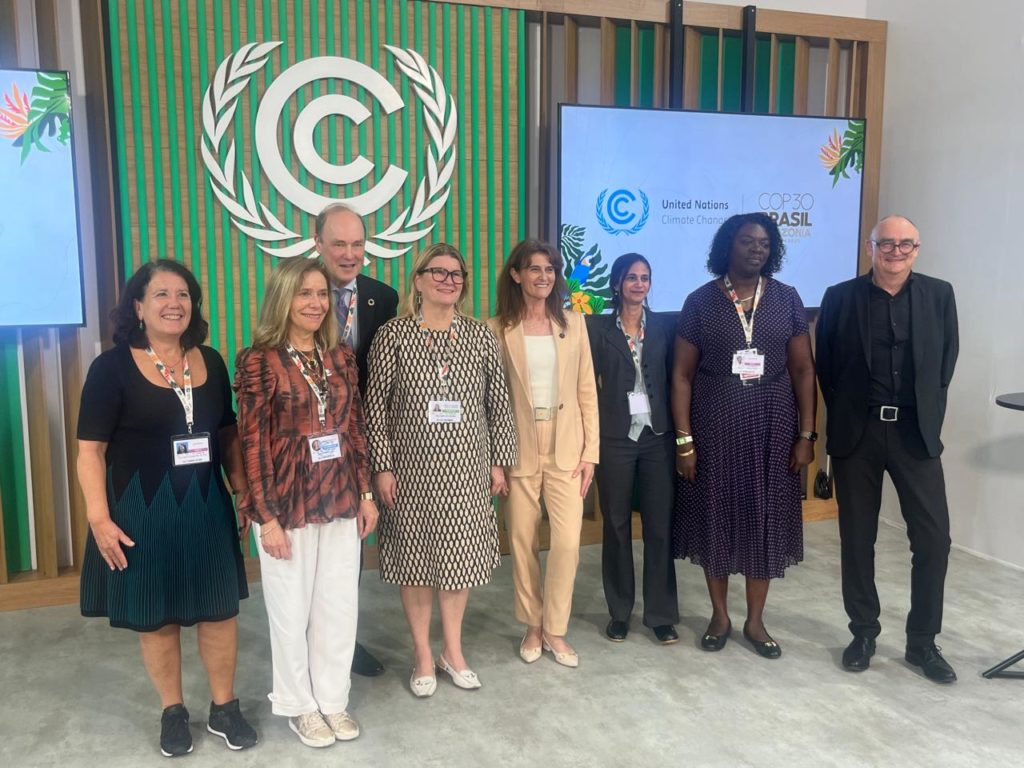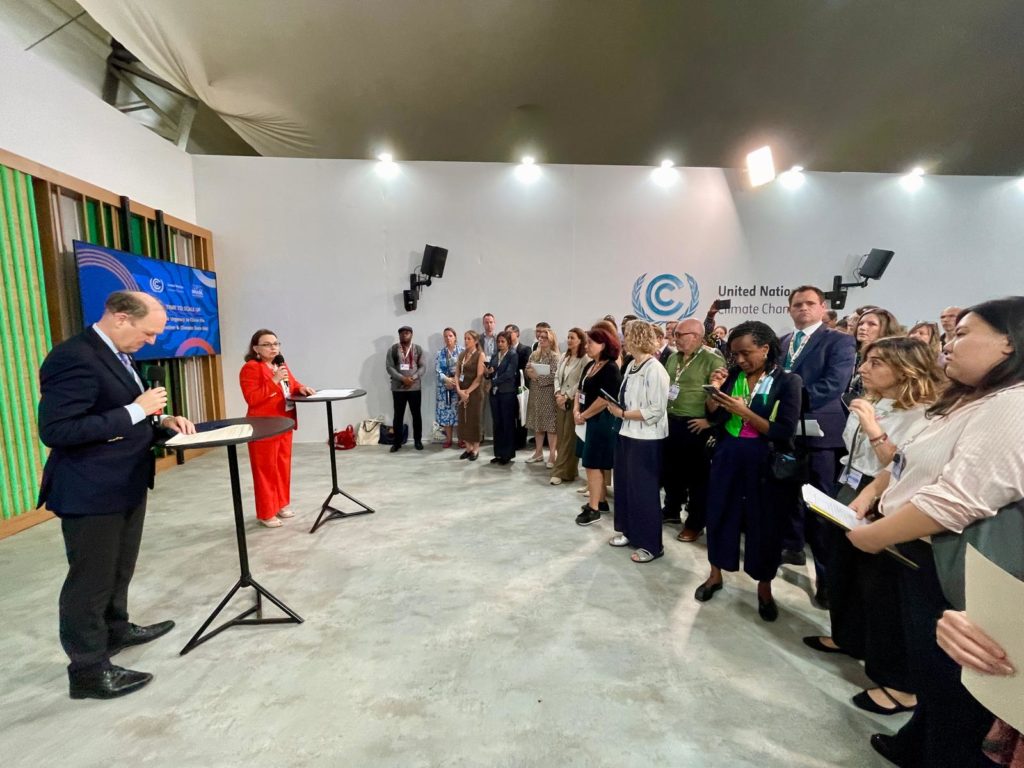Time to Scale Up: Global Momentum for SOFF’s Mission to Close the Weather and Climate Data Gap
Belém, Brazil, 11 November 2025 — During COP30, global leaders rallied behind the Systematic Observations Financing Facility (SOFF) in its mission to close the world’s most critical weather and climate data gaps. At a high-level event hosted by the UNFCCC, SOFF launched its 2025 Action Report. Governments showcased implementation progress, funders announced new pledges to the SOFF UN Fund, and the heads of Europe’s leading meteorological institutions called for stronger international support.
SOFF Action Report 2025: Evidence, Action, and Far-Reaching Impacts
Unveiled at the event, the SOFF Action Report 2025 charts how the Facility and its partners are closing the global weather and climate data gap. It captures three years of rapid progress: USD 116 million in approved country funding, support to over 60 nations, and 18 countries already receiving Investment Phase support.
“Our journey has only begun. To close the data gap once and for all, we need more partners, more ambition, and more courage,” said Celeste Saulo, Secretary-General of the World Meteorological Organization (WMO). “I invite all of you — governments, institutions, and philanthropies — to join us. Let’s make this the decade when no country is left unobserved.”
“We are very grateful to the partners who are leaning in,” said Inger Andersen, Executive Director of UNEP. “This is critical infrastructure, and it is entirely doable. While it will not solve the climate crisis, it will keep people out of harm’s way and help us project into the future what actions we need to take.”
The report also highlights the results of the recent study the European Centre for Medium-Range Weather Forecasts (ECMWF) showing that closing the data gap could reduce forecast uncertainty in Africa by up to 30 per cent and in the Pacific by over 20 per cent — improving resilience across sectors from agriculture to insurance.
From National Progress to Global Impact
At the event, high-profile speakers shared national perspectives on how SOFF support is translating into real-world results. One of the strongest testimonials came from Bhutan’s Prime Minister, Lyonchhen Dasho Tshering Tobgay: “The Systematic Observations Financing Facility has been transformative for Bhutan. For the first time, Bhutan is deploying advanced upper-air observation systems. Every step Bhutan takes to improve observation, and preparedness strengthens resilience for the entire region. It is a global investment in shared security and prosperity.”
Marcos Neto, UNDP Assistant Administrator and Director of Bureau of Policy and Programme Support, highlighted that Rwanda — where UNDP is a SOFF Implementing Partner — is already sharing new data internationally, improving forecasts.“We are powerful enablers of development and resilience, providing an evidence base for government decision-making on food security, disaster preparedness, and long-term planning.”
Tangible Pledges to Keep Up the Pace
New pledges from Belgium (EUR 8.3 million), Ireland (EUR 8 million), and Spain (EUR 5 million) underscored the confidence in SOFF’s results-based model and tangible impact.
Maxime Prévot, Belgium’s Deputy Prime Minister, shared a strong message: “Protecting lives and livelihoods is a fair and noble goal. That’s exactly what SOFF is doing — fast, effectively, and with real impact. Join me in supporting SOFF.”
Pedro Sánchez Pérez-Castejón, Prime Minister of Spain highlighted in his video message: “We have exceeded our international climate finance target ahead of schedule, and we are committed to continuing on that path. We will pursue our climate finance roadmap with determination.”
Neale Richmond TD, Ireland’s Minister of State for International Development and Diaspora, emphasized: “The new funding will help the most climate-vulnerable communities to prepare, adapt, and ultimately save lives, livelihoods, cultures, and biodiversity. That’s why we join in calling on others present at COP to invest in SOFF.”
Powerful Call for Support from European Meteorological Leaders
A major show of support came from Europe’s leading meteorological institutions — ECMWF, the European Operational Satellite Agency (EUMETSAT), the network of European Meteorological Services (EUMETNET), and WMO — which jointly issued a declaration presented by Dr. Florence Rabier, Director-General of ECMWF.
“Closing these gaps not only contributes directly to the Early Warnings for All initiative but also maximizes the value of European and international investments in weather and climate infrastructure, modeling, and services,” said Dr. Rabier. “This is why we came together as a community — to clearly express our commitment to investing in SOFF.”
The declaration calls for urgent and coordinated investment to close the observation gap, encouraging EU Member States and development partners to scale up funding for surface-based observing systems through SOFF. It also supports including systematic observations in the next EU budget under the Copernicus Programme and welcomes the forthcoming Systematic Observation Impact Bond as a tool to accelerate results.
The Next Frontier: Innovating Finance for a Global Public Good
The SOFF event also looked ahead to the next stage of the Facility’s funding: the Systematic Observation Impact Bond, an innovative financing instrument designed to scale up impact. It will be officially announced on 14 November as part of the COP30 Action Agenda.
Markus Repnik, SOFF Director, said the initiative reflects the need for fresh approaches to financing a shared resource: “The new impact bond will allow us to front-load investments and act fast for the delivery of a global public good that benefits everyone.”
Satu Santala, Managing Director of the Nordic Development Fund, underlined the urgency of continued partnership: “We need financing fast — we can’t let the momentum vanish. We must match the commitment with the sustainable financing it requires.”
Even before its official announcement, the new initiative is already attracting commitments. Dr. Surabi Menon, Vice President of the ClimateWorks Foundation, said: “At ClimateWorks Foundation, we were one of the first movers and the anchor funder, contributing close to USD 1.2 million to this new Impact Fund. But it is conditional finance — it only unlocks if more funding comes in. We hope to see many of you step up and provide the additional support.”
The new Systematic Observation Impact Bond aims at mobilizing USD 200 million by the end of 2026 from investors, backed by governments and philanthropies.
SBSTA Calls for Expanded Support Through SOFF
Later in the week, the SBSTA welcomed updates on advances in systematic observation, including through initiatives such as the Systematic Observations Financing Facility (SOFF). It also recognized the important role of SOFF in supporting Global Basic Observing Network compliance and early warning systems. Parties invited SOFF to consider extending its support to additional developing countries, beyond its current priority group of 77 Least Developed Countries and Small Island Developing States. This represents another strong signal of global demand and growing momentum for scaling up.


YOU MAY ALSO LIKE...





